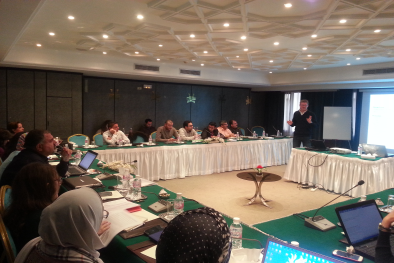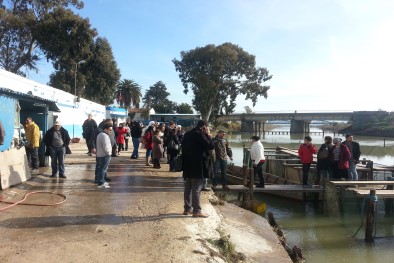The Training Programme consists of five phases stretching from June 2014 to October 2015, with three individual work phases and two courses allowing participants to meet. The recent course in Tunisia followed the first one in Sweden in September 2014. The Training Programme’s overall objective is to support the change process within key organizations responsible for the planning, development and management of coastal areas, in order to enhance exchange between them, and contribute thus to an integrated approach throughout the countries of the region.
The recent course in Tunisia focused on enriching the theoretical knowledge shared in Sweden with regards to the ongoing, regional political processes and initiatives in the Mediterranean, on engaging participants in discussions with their mentors in order to support the implementation of their individual change projects, as well as on confronting theoretical learning with field realities through the assessment of two costal case studies: a) the examination of the process to depollute the Bizerte - Ichkeul Lake System in the North-East of Tunisia, initiated in the framework of the H2020 initiative for the depollution of the Mediterranean Sea, and b) the examination of the depolluted site of Taparura in Sfax in the East South of Tunisia.

In the first case, a field trip was organized to visit sources polluting the lake, such as the steel company and the wastewater treatment plant of Sidi Hmed, as well as the aquaculture company fishing from the Bizerte Lake. The visits at the Joumine Dam and the Ichkeul Lake Conservation Center offered participating ministry representatives a better understanding of the ecological complexity of Bizerte - Ichkeul Lake System. Participants were also presented with the context of the Bizerte Lake Charter signed by a large number of stakeholders. In the second case, participants visited on site the city of Sfax to find out more on the project that reconciled it with the Sea by depolluting its northern coasts, rehabilitating its beaches and creating land to allow the extension of the urban area in a sustainable and integrated way. A visit to the southern coast of Sfax, where participants observed the Phosphogypsum Mountain threatening the environment of the city, allowed them to realize the huge improvement reached in Taparura.
Upon the two field trips, participants were divided into 4 working groups focusing on economic efficiency, social equity and environmental sustainability - the three pillars of sustainable development - and the participatory approach, conducting interviews with the main stakeholders to identify lessons learned, best practices for replication and recommendations to ensure the process’ sustainability. The results of the different working groups were presented to the interviewed stakeholders, while the course also included a networking session to identify future possible collaborations between countries and participating organisations.

2nd National Seminar on Integrated Sustainable Coastal Develoopment
With Integrated Coastal Zone Management calling for commitment from all involved stakeholders - public institutions, local authorities, private sector, civil society, international and regional organizations, academia, etc. - a high level of coordination has to be reached to build a consensus based on the alignment of different perspectives.
In this context, the MENA ISCD Training Programme, held the first national seminar on ISCD in Tunisia, in April 2014, to strengthen coordination and dialogue between stakeholders involved in coastal management. As a follow-up to their own recommendation for enhanced networking and exchange on coastal management on national level, the participants to the first national seminar undertook on their own initiative the organization of a second national seminar. It was held on February 6, 2015 by GWP-Med, in collaboration with Manouba University, aimed at exploring opportunities for the establishment of a multi-stakeholder national platform on Integrated Coastal Zone Management to enhance dialogue and collaboration among the different stakeholders.
More than 50 participants from key stakeholders participated to the national seminar with discussions focusing on the objectives and the operational modalities of such a platform. As a next step, a core group of 10 participants volunteered to work on the identification of the legal framework under which such a platform could be established.
